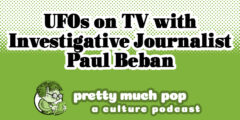
TV news reporter Paul Beban (ABC, Al Jazeera, Yahoo, and now featured on the Discovery Network's Contact) joins your hosts Mark Linsenmayer, Erica Spyres, and Brian Hirt to discuss the public fascination with UFOs, both at the peak of their popularity in the 50s and in the current resurgence. Do accounts of sightings necessarily make for good TV? Do you have to believe to be entertained? Is belief in UFOs related to religious belief? To beliefs in conspiracy theories and anti-government venom? To humor?
We get into the mechanics of Contact, the Area 51 hubbub,and also touch on the show Project Blue Book, films like Arrival (2016) and UFO (2018), the documentary Unacknowledged (2017), the short story "Roadside Picnic," and more. To learn more about UFO lore in America, check out some of these podcasts.
Some of the resources we used for this episode included:
- "The New American Religion of UFOs" by Sean Illing
- "Why Are Area 51 Conspiracy Theories So Popular? Here's What Psychologists Say" by Jeffrey Kluger
- "35 of the Most Popular Conspiracy Theories in the US" by Frank Olito
- "More UFOs Than Ever Before" by Rich Cohen
- "What Kucinich Saw: Witnesses Describe His Close Encounter" by Michael M. Phillips
- "Those UFO videos are real, the Navy says, but please stop saying ‘UFO’" by Kayla Epstein
Plus, here are some stats from Gallup about UFO sightings and belief, you might want to pick up the book Nostalgia for the Absolute that Paul refers to, and here's the 2014 talk by Robbie Graham that Brian referred to describing "hyper-reality" and the Hollywood UFO conspiracy. Here's a list of UFO documentary series.
This episode includes bonus discussion that you can only hear by supporting the podcast at patreon.com/prettymuchpop. This podcast is part of the Partially Examined Life podcast network.
Pretty Much Pop is the first podcast curated by Open Culture. Browse all Pretty Much Pop posts or start with the first episode.
The Appeal of UFO Narratives: Investigative Journalist Paul Beban Visits Pretty Much Pop #14 is a post from: Open Culture. Follow us on Facebook, Twitter, and Google Plus, or get our Daily Email. And don't miss our big collections of Free Online Courses, Free Online Movies, Free eBooks, Free Audio Books, Free Foreign Language Lessons, and MOOCs.
from Open Culture https://ift.tt/2Vpd5Fq
via Ilumina
Comments
Post a Comment